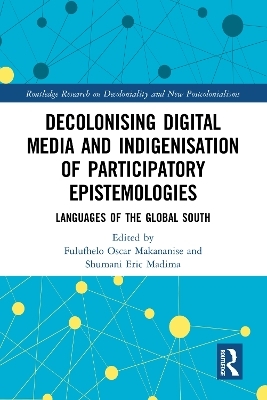
Decolonising Digital Media and Indigenisation of Participatory Epistemologies
Routledge (Verlag)
978-1-032-80468-2 (ISBN)
It is one of its kind as it climaxes that the construction phase of self-determining and redefining among the global South societies is an essential step towards decolonising the digital landscape and ensuring that indigenous voices and worldviews are equally infused, represented, and privileged in the process of higher-level communication, exchanging epistemic philosophies, and knowledge expressions. The book employs an interdisciplinary approach to engage in the use of digital media as a sphere for resistance and knowledge transformation against the persistent colonialism of power through dominant non-indigenous languages and scientific epistemic systems. It further advocates that decolonising digital media spaces through appreciating participatory epistemologies and their languages can help promote the inclusion and empowerment of indigenous communities. It indicates that the decolonial process can also help to redress the historical and ongoing injustices that have disadvantaged many indigenous communities in the global South and contributed to their marginalisation.
This book will appeal to undergraduate and graduate students, scholars, and academics in communication, media studies, languages, linguistics, cultural studies, and indigenous knowledge systems in higher education institutions. It will be a valuable resource for those interested in epistemologies of the South, decoloniality, postcoloniality, indigenisation, participatory knowledge, indigenous language legacies, indigenous artificial intelligence, and digital media in the Fourth Industrial Revolution.
Fulufhelo Oscar Makananise is an Associate Professor in the Department of Communication Science at the University of South Africa (UNISA). He holds a doctoral degree in Media Studies from the University of Limpopo. Prof. Makananise obtained a PG (dip)HE from Rhodes University. He also serves as an external examiner in other South African universities and as a reviewer in international and national scholarly journals. Prof. Makananise has authored and published academic articles in peer-reviewed and DHET-accredited journals. In addition, Prof. Makananise has presented papers at both national and international conferences. His research interests include new media technology, digital media, indigenous language media and social media, political communication, digital diplomacy, and news media consumption. Shumani Eric Madima is a Linguistics Senior Lecturer at the University of Venda (UNIVEN) in the Department of English, Media Studies and Linguistics, Faculty of Humanities, Social Sciences and Education. He teaches Linguistics to undergraduate and postgraduate students. He completed his BA degree at the University of South Africa (Unisa), BA (Hons) in Applied Linguistics at the University of Pretoria, MA (Cum Laude) in Linguistics, and PhD in Linguistics at the University of Venda. He has been a teacher and a lecturer at South African Teacher Education (SACTE). His fields of specialisation are Sociolinguistics, Language Planning, Psycholinguistics, Language and gender, Linguistics in Educational Context and Media Studies. He has written several articles on various themes, such as Linguistics and Media Studies, which have been published in different international journals.
Introduction: A Decolonial Study of Digital Media and the Epistemic Indigenisation of the Indigenous Future
Fulufhelo Oscar Makananise and Shumani Eric Madima
PART I: DECOLONISING DIGITAL SPACE, AND INDIGENOUS LANGUAGE PRESERVATION
Chapter 1: Decolonial Thinking of Digital Media Inequalities and Indigenous Language Marginalisation of the Global South from the South African Context
Fulufhelo Oscar Makananise
Chapter 2: Preservation of Indigenous Languages, Changes in Digital Media, Social Development, and Family Communication
Emmanuel Ezimako Nzeaka and Beryl A. Ehondor
Chapter 3: Decoloniality of the Internet: Linguistic Revolution of the Marginalised Minority South African Indigenous Languages
Shumani Eric Madima and Fulufhelo Oscar Makananise
Chapter 4: Incorporating Indigenous Language in TikTok Content Creation: Influence of IsiZulu in Content Creation
Khatija BiBi Khan
PART II: EPISTEMIC DECOLONIAL NARRATIVES, DIGITAL HUMOUR, AND POSTCOLONIAL PARTICIPATORY EPISTEMOLOGIES
Chapter 5: Convergence between Educommunication and Good Living: Decolonial Narratives of Other Possible Futures
Thais Brianezi
Chapter 6: ‘Tlen quihtoa moyollo?’ – ‘What does your heart tell you?’: Language Revitalisation and Postcolonial Cultural Education Among the #Nahuatl Language Teaching Community on TikTok
Amanda R Ruschak
Chapter 7: Chasu: A Favoured Medium in Endearment and Amusement in Online Chats by Chasu Native Speaker multilinguals in Tanzania
Erasmus Akiley Msuya
PART III: EPISTEMOLOGIES OF MARGINALISED GROUPS AND DIGITAL PRESENCE OF NATIVE LANGUAGES
Chapter 8: The Revalorisation of the Native Languages in the New Bolivia: Strategies for Changing Minds towards the Democratic and Cultural Revolution
Eduardo Lopez Rosse
Chapter 9: Revitalising Endangered Languages through Social Media: A Case Study of Olunyore Language Preservation through Facebook in Kenya
Jackline U. Lidubwi and John O. Ndavula
Chapter 10: Visibility of Indigenous Groups through Creativity and Social Networks in Mexico
Eva Citlali Martínez Estrella
Chapter 11: Promoting the Use of the Nama Language on YouTube in Democratic South Africa
Edgar Julius Malatji, Nhlayisi Cedrick Baloyi, Mawethu Glemar Mapulane, Amukelani Collen Mangaka and Rudzanimbilu Muthambi
| Erscheinungsdatum | 11.07.2024 |
|---|---|
| Reihe/Serie | Routledge Research on Decoloniality and New Postcolonialisms |
| Zusatzinfo | 10 Tables, black and white; 2 Line drawings, black and white; 2 Illustrations, black and white |
| Verlagsort | London |
| Sprache | englisch |
| Maße | 156 x 234 mm |
| Gewicht | 576 g |
| Themenwelt | Geschichte ► Teilgebiete der Geschichte ► Wirtschaftsgeschichte |
| Geisteswissenschaften ► Sprach- / Literaturwissenschaft ► Sprachwissenschaft | |
| Naturwissenschaften ► Geowissenschaften ► Geografie / Kartografie | |
| ISBN-10 | 1-032-80468-8 / 1032804688 |
| ISBN-13 | 978-1-032-80468-2 / 9781032804682 |
| Zustand | Neuware |
| Informationen gemäß Produktsicherheitsverordnung (GPSR) | |
| Haben Sie eine Frage zum Produkt? |
aus dem Bereich


